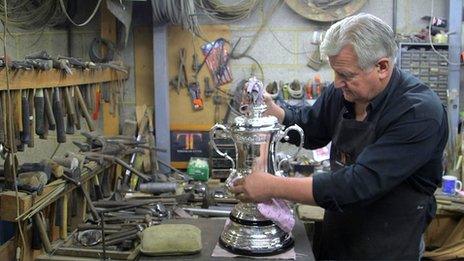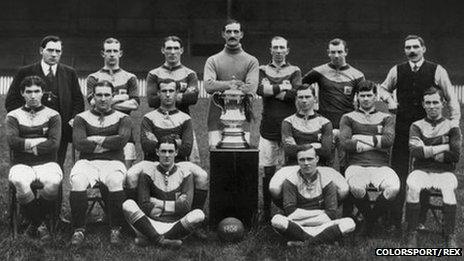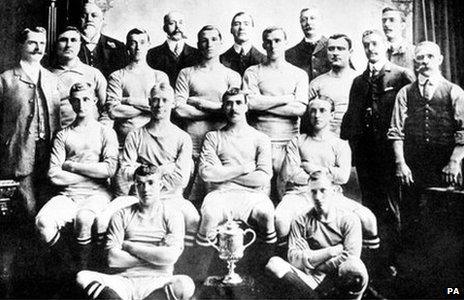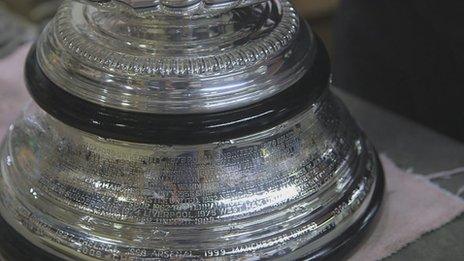FA Cup reborn for 2014 final as new trophy is cast
- Published

Time up - the 1992 production of the FA Cup was won for the last time by Wigan
There may or may not be a new FA Cup winner on Saturday, but there will be a shiny new trophy, as the current edition - hoisted aloft in the past 22 finals - has been retired.
Hull City, in a first final, or 10-times winners Arsenal, will lift only the third edition of this iconic cup, designed over a century ago in 1911.
The Football Association is retiring the current cup due to wear and tear.
Originally clubs played for a smaller-sized trophy between 1872 and 1910.
'National treasure'
The latest edition of the world-famous silverware, to be unveiled at the Wembley final, has been made by Thomas Lyte Silver.
The firm's UK craft workshops produce high-end gold and silver trophies and, as well as being the FA's silversmiths, are also official restorers of silverware to Buckingham Palace.
The new trophy is made from sterling 925 silver, and underwent a process of casting, hand chasing, hand engraving and polishing.
"After many years of restoring the previous trophy, we are honoured to be making the new FA Cup," says Kevin Baker, chief executive of Thomas Lyte.
"It is a national treasure, an icon of British football, and its heritage is embedded within the design and craft of the new trophy. The new trophy is an absolute replica based on the 1911 trophy."
Cup tours
He says that the new cup would be heavier than previous versions, but there is a good reason for that.
Whereas the FA Cup would at one time remain in the winning club's trophy cabinet for a year, now it is a touring attraction.
"The way trophies are used in the modern era has totally changed - there is more presentation and use of the FA Cup than ever before," says Mr Baker.

Silversmith Kevin Williams puts a finishing touch to the new FA Cup trophy
"You might take it - for example - to a school and it gets dropped, and then they try to repair it themselves and accidentally cause more damage.
"It is amazing the way football has entered into everyday life. The trophy is constantly in demand - that is why we have made it in a way that is more equipped for those changes."
Bradford connection
Mr Baker says that as well as being more robust, the new FA Cup trophy would bring "incredible clarity" to the original design and its delicate features.
A company employee will be at Wembley with their tools, ready to inscribe the name of Hull City or Arsenal on to the cup as soon as the full-time whistle blows.
The firm makes sporting medals for sports federations and tournaments in the UK and around the world, including the Football League, US Major League Soccer, Asian Football Confederation, and non-footballing bodies including for ATP tennis and the Rugby World Cup.

Bradford City were the appropriate first winners of the current FA Cup design
The FA Cup trophy being "retired" was introduced in 1992, when Liverpool were the winners, and was last won in 2013 by Wigan Athletic.
However, the first version of this instantly recognisable cup was made more than a century ago, in 1911.
Bradford City were the first winners, beating Newcastle United in a replayed final.
It was an appropriate triumph as the trophy had been designed and manufactured by jewellers Fattorini's of Bradford.
Cup stolen
There have actually been two different designs of the FA Cup - the current design - dating back to 1911, and the first, smaller design.
That initial trophy, standing 18in high, and known as the "little tin idol", was competed for from 1871-72 until 1910. And even that version had to be made twice.

Manchester City with the previous FA Cup design in 1904
The first was played for until 1895, when it was stolen from the window of a Birmingham shoe shop.
It was later said to have been melted down to make counterfeit coins. Holders Aston Villa were fined £25 in order to pay for a replica to be made.
That cup was last used in 1910 before being presented to the FA's long-serving president Lord Kinnaird.
In 2005 it was bought at auction by then Birmingham City joint chairman David Gold (now West Ham co-chairman) and presented for permanent display at the National Football Museum, now based in Manchester.
Global audience
The museum's collections officer, Alexander Jackson, says he can understand why the FA Cup has become such a football icon.
"It is all associated with it being the oldest cup competition in the world, and also to the time when it was one of the few matches that could be seen on TV, and those pictures would then go around the globe," he says.
He says that both designs of the cup - the 1872-1910 design and the 1911 to present day one - have been "beautiful, ornate designs".

The band on the base showing previous winners has been moved to the new cup
"More modern trophies have cleaner designs, but for me they lose a little something compared with those Victorian and Edwardian designs," he says, adding that the 1910 cup is a great attraction at the museum for those interested in the early days of football history.
Ahead of Saturday's final Alex Horne, general secretary of the FA, has welcomed the introduction of the newest model, which will be heading to East Yorkshire or north London.
"This is a historic moment in the proud 143-year history of the FA Cup," he said.
"This is only the third version of the iconic trophy since 1911, which is quite a record, especially given the trophy's extensive and growing use in modern times, particularly through the media."